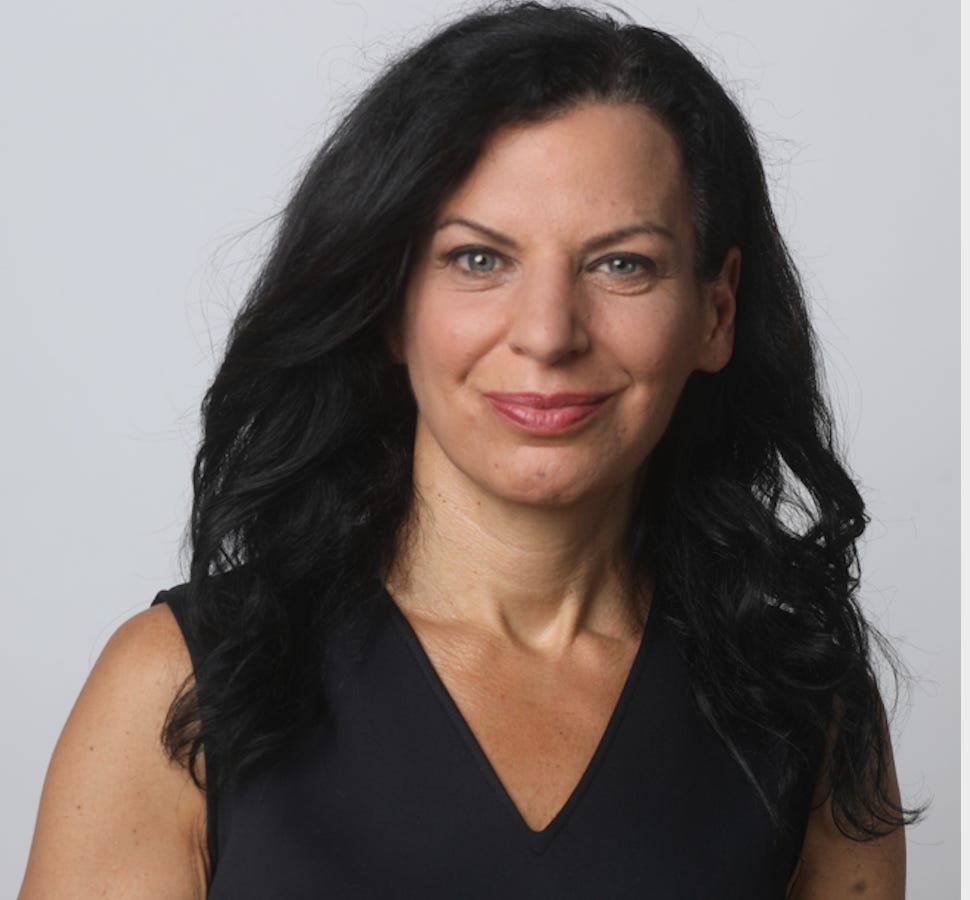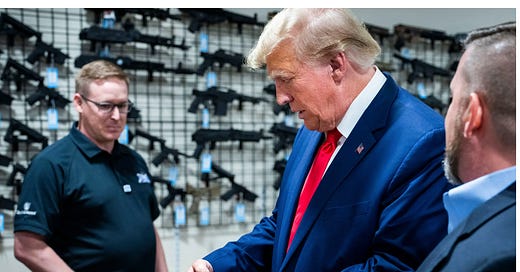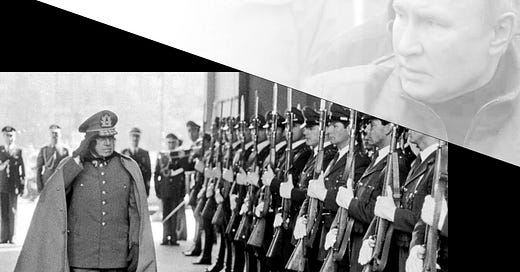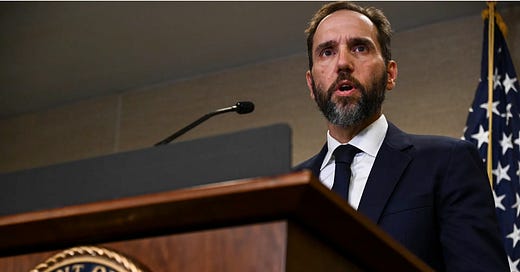
Juliette Kayyem On How to Deal With Extremists
Take preventive measures against the US convoy movement and its weapons of mass interruption
I'm pleased to bring you this interview with Juliette Kayyem, who is an international leader in crisis management, disaster response and homeland security. Kayyem serves as the faculty chair of the Homeland Security and Security and Global Health Projects at Harvard's Kennedy School of Government. She served as President Obama's Assistant Secretary at the Department of Homeland Security. She is a CNN national security analyst and Pulitzer Prize finalist. Her latest book, The Devil Never Sleeps: Learning to Live in an Age of Disasters, will be published in March 2022.
Ruth Ben-Ghiat (RBG): you've been an indispensable commentator on the threat of extremism in the US and the importance of calling out domestic terrorism. I'm wondering how you see the GOP's trajectory in the wake of Jan. 6, given that the party has embraced extremist ideologies and methods.
Juliette Kayyem (JK): I don't know if the party can turn back. For me, the focus has always been: are they unleashing violence or the threat of violence? During Trump's presidency I used the term stochastic terrorism [when ideology and rhetoric motivate and incite violence that is probable but not predictable]. Trump did not directly tell people to commit violence but the reasonable listener who supported him could believe that he was condoning violence and also believe that he would forgive any violence committed.
That changed with Jan. 6. A federal judge has now agreed that there are grounds for considering Jan. 6 as a targeted attack and that we can reasonably conclude that his listeners understood him to be saying, go do X. [The judge also agreed that there are grounds for arguing "a plausible conspiracy involving President Trump" and those who carried out the attack]. We shouldn't be afraid of using the word terrorism because terrorism just means violence or the threat of violence for a political agenda.
RBG: I'm curious what you think about prosecuting Trump. Some people think it's too dangerous, because it would cause unrest and violence among his well-armed followers. But we already had violence, on Jan. 6., and prosecution is important to burst the aura of invincibility that autocrats can enjoy. Where do you stand on this?
JK: I started my career as a counterterrorism lawyer, so I view this through that prism. The leader always matters in counterterrorism efforts. And what happens to him matters. Is he isolated? Is he defunded? Is he deplatformed? Does he find it hard to raise money?
You know, after Jan. 6th I wrote a piece for the Atlantic that angered a lot of people. It basically said that we need to view [the attack] through the lens of counterterrorism. There is a term in counterterrorism called decapitation, and of course in this case the term is used figuratively, not literally. When you take out the leader of those who would use terror, or when you isolate him, you make it more difficult for him to seem like the winner.
Such leaders live off of the idea and take their power from the idea that they are winning, so you need to break down that narrative. So, if the law would fit [allow for prosecution], we can't worry about upsetting his people. His people are already upset.
RBG: It sounds as though you are not surprised at the longevity of Trump's leader cult.
JK: I'm not surprised, but coming from a counterrorism perspective my goals are more limited than what you hear from many people on Twitter, who want him in jail, and want his kids in jail. Going after the leadership with all the cases [opened by the House committee to investigate Jan. 6] and deplatforming him have had an effect.
Let's just be real, Donald Trump cannot fill a room anymore. He's trying to get people to come to an event [for members of his Mar-a-Lago club] where he is the DJ now. So, if your goals are more strategic than having him and his kids in prison, I think there's a lot of success out there right now.
RBG: I want to ask you about the convoy movement of extremists in Canada that has spawned a copycat initiative here in the US. The big difference is that here lawmakers are soliciting grassroots extremists to "clog up cities," as Sen. Rand Paul has declared.
I view this as another effort to destabilize our democracy. What do you foresee happening here, and what should be done to forestall this so we don't have a repeat of Ottawa?
JK: Well, I think that from the law enforcement perspective, Canada waited too long [to act]. They viewed it as legitimate to begin a discussion about vaccine mandates that took the form of a threat of closing international travel and commerce. I'm not buying that, and I didn't understand why it took [the government] so long to intervene. These are weapons of mass interruption that are equally destructive to the economy and to communities.
I think you're already seeing the disruption here, and we are seeing a response in the very public posturing of authorities in Washington DC, like the Capitol Police and the National Transportation Safety Board. They are putting out statements [to get ahead of this].
These are commercial vehicles and like commercial aviation, it's a heavily regulated industry. If you lose your certification, you cannot have a job. Most of these guys do not own the trucks they drive; they rent them because it's too expensive to own. So the owners of those trucks need to be notified.
I believe that had there been a military or police presence at the Capitol [on Jan. 6], 95% of those people, who were noisy trespassers, would have gone away. Of course you have the 5% of people who were going to try and make it inside. But what you want to do is get those who are not as committed out of the pool, to isolate the far fewer truly committed people.
And then you've got to use everything you have to stop vehicular traffic obstruction: deflate tires, take license plate numbers, and more. No messing around. You are not allowed to use our federal highway system as a means for your annoyance with the government.
RBG: I just wonder how it plays out here given the powerful people in media, like Tucker Carlson, and government will be actively supporting the disrupters.
JK: Well, they backed it in Canada. A lot of the money and support came from the US. It will be very interesting to see what happens as we get closer, because one of the things that you find with Tucker and those guys is it's very easy for them to say things, but then when there are consequences that become indefensible, they can change their tune.
I wish that every mayor and police chief who may be facing this would say to the organizers: I'm not having this discussion. You are not going to threaten me with a convoy. We have to be a little tougher with these people.











A few corrections of some of JK’s misunderstanding of the American trucking industry .. which thankfully doesn’t affect her speculations … and suggests a slimmer likelihood for an American insurgent convoy. Yes, most drivers don’t own the trucks they drive: 90% of drivers, like me the last 22 years, are employees of the company which owns the truck - unless we want to risk getting arrested for stealing the owner’s truck, there is NO chance we can detour from the route we are ordered to drive, to join a “convoy”. The other 10% are “owner operators” … but they “own” their truck the same way you “own” your house … as long as your make your huge monthly payment (as large as a mortgage), you “own” it … the vast majority of “owner ops” must drive most every day to make that payment or they lose the truck (and all those previous payments) in a month or two … so they aren’t free (except by rare chance, if they are hauling on the convoy route) to join a convoy… so there are a few thousand trucks out of the more than 3million that daily deliver our stuff in this country, who might be able to physically join a convoy, and spend several $thousands on fuel, to cosplay insurgency in their big rigs. And to effectively prevent those few thousand …. DOT just needs to warn them: you disrupt our interstates … we take away your authority to operate your commercial vehicle in the US. DONE!!!
I like the way Dr. Kayyem thinks. Should the MAGA truckers show up, bring the hammer down early and hard. Deflate the tires, impound the trucks, pull the CDL licenses, charge them with everything from jaywalking to illegal parking to every single violation that can be found on the vehicle.